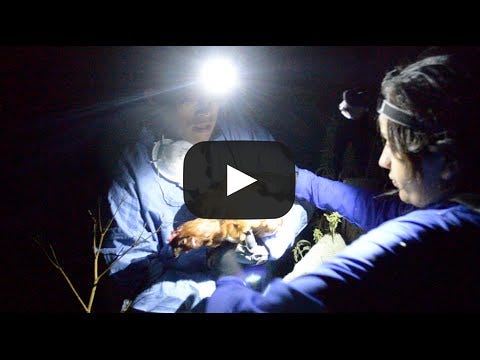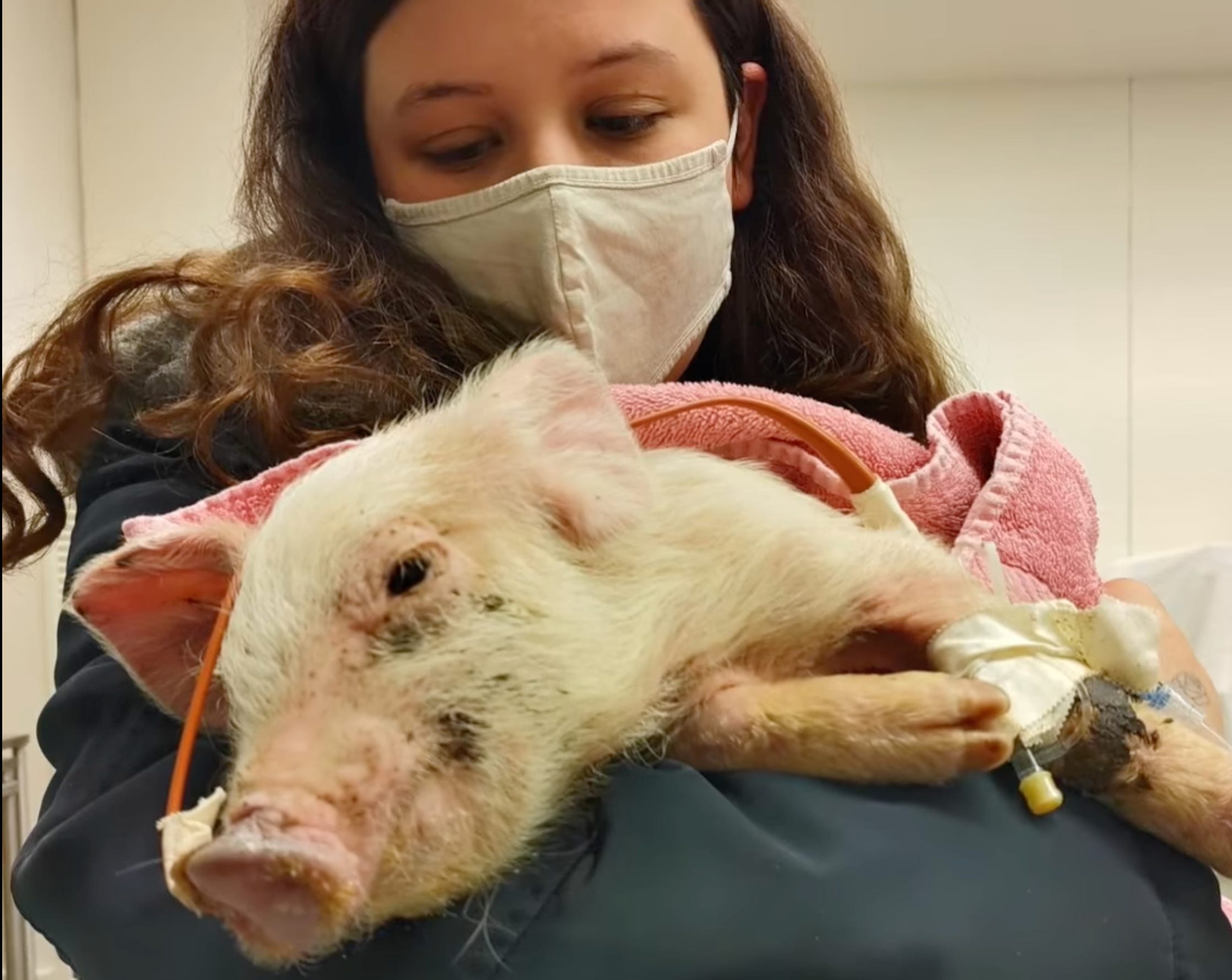The cure for shame
What the story of an abandoned piglet can teach us about the folly of "saving face"
There’s an old saying in Chinese, Mei Mianzi, that is arguably the most important one in our culture. It’s literally translated as, “Have you no face?” But it’s more accurately understood as “Have you no shame?” My mom used to say this to me when I was too open about my problems in life, e.g., getting in trouble in school (which happened frequently, especially in my teenage years).
The saying is an interesting one, however, because the source of the criticism is not the underlying problem, but the fact that you have failed to hide it behind a “face.” It’s the face that matters; not whatever foulness is hiding underneath. I never understood this, even as a child. After all, if what I am doing is shameful, then shouldn’t I be criticized for doing shameful things, not for failing to hide it under a face?
“I don’t believe in saving face, Mom,” I would say. “It’s too hard.”
Mom would shake her head but smile. On some level, she agreed.
I was reminded of the concept as I read a powerful long-form piece by Marina Bolotnikova in Current Affairs, about the importance of direct action in fighting corporate abuses. While her focus in factory farming, and the work of my friends at Direct Action Everywhere, the point she makes is a more general one: to challenge injustice, you have to get closer to it. The reason is quite simple: injustice is almost always hidden by a happy face. But if you don’t get closer, you won’t see the difference between the face and the foulness underneath. Some examples:
We imprison an innocent man and call it “justice for victims of crime.”
We pollute our air and our water, poisoning our children in the process, and call it “energy independence.”
We torture billions of sentient beings and market it as “humane meat.”

This last example is, of course, near and dear to me. It’s the one I’ve spent most of my life working against. But it’s also the one where our society’s “face” is arguably most disconnected from the “foulness” underneath. Marina’s story offers one example:
In January of this year, seven activists were driving through factory farm country in central Iowa. For those who have never been to this part of America, the sight can be surreal: Massive piles and dumpsters filled with dead pigs and piglets, discarded as trash, can be seen from the road. This apocalyptic scene is a common and inevitable part of industrial animal agriculture. Factory farms are breeding grounds for death and disease, and animals are routinely killed because they’re sick, injured, or just too small to be profitable. But in one of those piles in Iowa, the activists spotted movement—a piglet who was still alive.
It was about 0 degrees Fahrenheit, the ground covered in snow, and the piglet was shivering and covered in blood as his tiny body rose and fell with each breath. The activists unburied him from beneath the other bodies, bundled him up and rushed him to a vet, unsure if he would survive. Charlie, as he was later named, was estimated to be three weeks old, weighed seven pounds, and had several health problems and injuries, including severe hypothermia and a broken jaw and rib.
I must confess: I found it difficult to read these words. I imagine my own little guy, baby Oliver, in that situation, crying out for help and wondering where his mama and papa have gone. And my world just breaks. It’s too hard to go on.
That feeling caused me to stop reading the article 3 times before I finally pushed my way through. And after reflecting, I realized that the feeling wasn’t anger (which can be activating) or anxiety (which can trigger curiosity) but a deep and foreboding sense of shame. And shame, unlike anger or anxiety, stops you like a brick wall.
I know the feeling all too well, especially when it comes to animal abuse. As a Chinese-American, I have been teased my entire life for being from a dog-eating race of people. I was mocked for many things as a child of immigrants in Central Indiana – poor English; a chubby face and legs; and hand-me-down clothes that came from my older sister – but among the insults that hurt the most was that I was an abuser of animals.
“Do you eat dogs, Wayne?” a classmate would ask, while others laughed. “What’s in your lunch?”
If only they knew. Dogs are not my enemies, or my lunch meat. They were and are the greatest loves of my life. To be condemned as an abuser of the ones you love most is a painful experience. And Marina’s words stopped me like a brick wall because they awakened that feeling in me again.
“What have we done?” I thought to myself, reading about little Charlie. “What have we done to the most innocent creatures on earth?”
You might ask why I feel responsible for what a callous factory farm owner had done, in a faraway place. Part of the answer is my family and culture’s tendency towards collective responsibility (and, thus, shame). I am an American, and a human. And it is my people — Americans, humans — inflicting such grievous torture on an innocent baby like Charlie.
Part of the answer is that I’m committed to a philosophy that equates acts with omissions. While the factory farmer was the one who left Charlie out to die, who committed the evil act, I am, in many ways, equally responsible for the deaths of many animals, by the things I’ve failed to do. There are hundreds of dogs and cats awaiting death sentences for the crime of being unloved, in shelters within minutes of where I write this article. There are millions of sick and dying animals just like Charlie, in factory farms just an hour from where I live. All of these creatures could be saved at relatively trivial cost to me. And yet I allow them to suffer and die, through the actions that I omit.
But the most important reason I feel shame is that I am complicit in saving face, and thereby hiding the foulness of the slaughter of animals all around me. Charlie’s torture and death are the inevitable result of a system that treats living, feeling beings as just things. And yet every time I walk by the bacon in the grocery store, and continue happily shopping as if nothing happened to someone just like Charlie to get that product into Trader Joe’s; every time I drive by a factory farm, on the way to a beautiful hike in North Bay, and refuse to imagine the cries of hundreds of thousands of birds shrieking in terror as their necks are broken, one-by-one; and every time I drive into San Francisco, and fail to recognize that Elon Musk is holding eerily-human-like beings in cages for gruesome brain experiments… every time I do these things, it feels like I’m just saving face. I am putting up a fantasy of normality on a society that is committing unspeakable acts of violence.
But here’s the key bit: I don’t have to do that. And, while the immediate pain of confronting these atrocities is difficult — as Ezra Klein has put it, when you take the Green Pill, by opening yourself to animal suffering, everything in the world changes — what I’ve learned over the years is that it’s easier to confront these truths than to hide from them. Marina, a brilliant young journalist who has the pedigree (as a Harvard grad) and skill (as a published writer for The New York Times) to be writing about much easier things, recognized this in a recent post she made on Twitter, shortly before publishing her article in Current Affairs.


What’s true for Marina, and for me, is true of our entire society. Confronting the atrocities we commit against animals directly might seem hard, at first, but it is, in fact, the easier path. Just look at the efforts the industry has been forced to take to avoid the problem. Passing laws that criminalize photography and violate the First Amendment. Pretending that efforts to rescue dying animals are acts of “terrorism.” Even sending FBI agents across state-lines to chase after rescued baby pigs. The contortions and rationalizations and outright fabrications this system has been forced to engage in, to “save face” with the public, are directly correlated with the foulness of the things that the system is trying to hide. And it’s hard to keep that all up.
Wouldn’t it be easier to just be, well, open? Mei Mianzi is simply not the way to live a good life.
We can only hope that the industry, for their sake and for the Earth’s, understands this lesson before it’s too late.
—
If you liked this post from The Simple Heart, why not share it?
